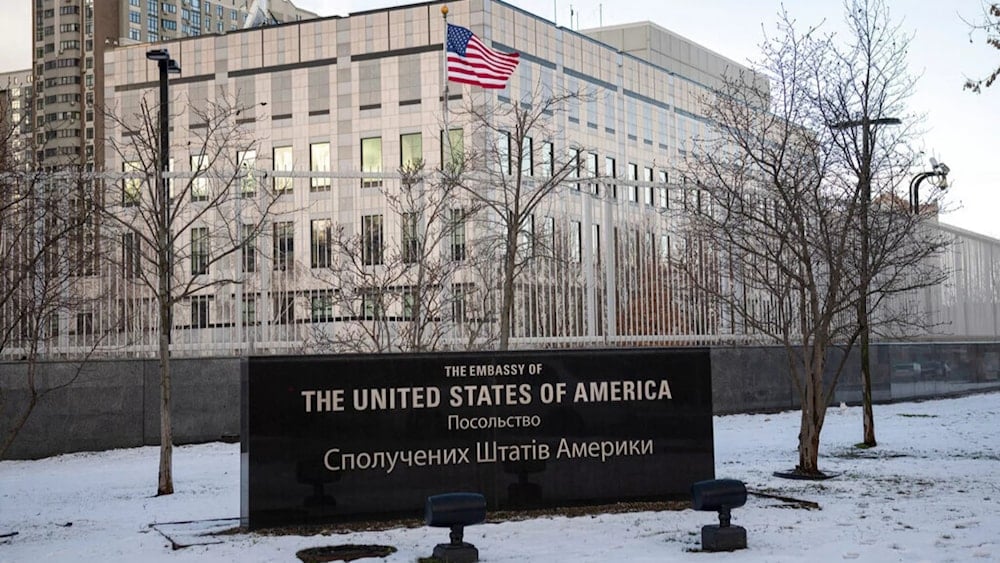US embassy in Kiev closes fearing 'air attack'
The warning follows Ukraine's use of US ATACMS missiles to target Russian territory, a move made possible by the recent authorization from the outgoing administration of US President Joe Biden.
-

A view of the US Embassy in Kiev, Ukraine, Saturday, February 12, 2022. (AP)
The US Embassy in Kiev has been informed of a possible major airstrike on Wednesday and will be closed, according to a statement from the US Department of State Consular Affairs.
"Out of an abundance of caution, the embassy will be closed, and embassy employees are being instructed to shelter in place," the department stated on the US Embassy's website in Kiev.
"The U.S. Embassy advises U.S. citizens to be ready to take immediate shelter if an air alert is issued."
This warning follows Ukraine's use of US ATACMS missiles to target Russian territory, a move made possible by the recent authorization from the outgoing administration of U.S. President Joe Biden on the 1,000th day of the war.
Russia had previously warned the West for months that allowing Ukraine to launch US, British, and French missiles deep into Russian territory would lead Moscow to consider those NATO members as directly involved in the war in Ukraine.
In October, Russian President Vladimir Putin stated that Moscow would retaliate against Ukraine's use of US-made weapons to strike deep within Russian territory.
Putin approves Russia's updated framework on nuclear deterrence
On Tuesday, Putin reduced the threshold for a nuclear strike in response to a wider range of conventional attacks, amid growing nuclear risks and the highest level of tensions between Russia and the West in over 50 years.
The timing of the issuance of the decree is critical, as it comes mere days after US President Joe Biden approved Ukraine's use of American long-range missiles against military targets within Russia, in a significant policy shift long sought by Kiev.
Putin has warned that such a decision would signify NATO's direct involvement in the conflict.
The decree, which takes effect on November 19, emphasizes enhancing Russia's nuclear deterrence strategy to address potential threats and maintain national security.
It categorizes aggression against Russia or its allies by a non-nuclear state supported by a nuclear one as a joint attack, adding that any aggression from a state within a military coalition is treated as an act of aggression by the entire coalition.
According to the document, deterring aggression is identified as one of Russia’s highest state priorities, supported by the nation’s overall military capabilities, including nuclear forces.
Conditions for use of nuclear weapons
Russia’s nuclear deterrence policy is described as defensive, aimed at maintaining its nuclear forces at a level sufficient to ensure deterrence, protect sovereignty and territorial integrity, and prevent the escalation of military conflicts.
The policy highlights the inevitability of retaliation in the event of aggression against Russia or its allies and is adaptable to evolving military dangers and threats.
The decree points out that the scope of nuclear deterrence encompasses states, blocs, or alliances that consider Russia an adversary, possess weapons of mass destruction, or provide resources for aggression against Russia.
Conditions that could prompt the use of nuclear weapons include reliable information on the launch of intercontinental ballistic missiles targeting Russia or its allies, actions to isolate parts of Russian territory, or attacks on ecologically sensitive facilities leading to catastrophic consequences, the document indicated.
Other conditions for Russia's potential use of nuclear weapons include confirmed launches of air and space-based attack systems, incursions into Russian borders, and the use of weapons of mass destruction against Russia or its military forces.
According to the decree, Russia’s nuclear deterrence forces consist of land-based, sea-based, and air-based components capable of inflicting unacceptable damage on potential adversaries.
The policy also identifies the deployment of nuclear weapons in non-nuclear states and the presence of advanced military technologies such as hypersonic weapons and attack drones as the main military danger for Russia.
The document underlines Russia’s efforts to reduce nuclear risks and prevent escalations that could lead to military conflicts, including nuclear ones.
It also reiterates the country's right to use nuclear weapons as an extreme measure in response to the use of weapons of mass destruction or conventional aggression against it or against its allies.
Moreover, the decree notes that the principles underpinning Russia's state policy on nuclear deterrence may be adjusted in response to external and internal factors.
It emphasizes that Russia views nuclear weapons as a deterrent, emphasizing that their use would be an extreme and last-resort measure.
Elsewhere, the document underscores that the decision to deploy nuclear weapons is made by the Russian President, who, if necessary, may notify other nations of such readiness.
Read more: Russia ratifies strategic partnership, pledges mutual defense

 5 Min Read
5 Min Read









